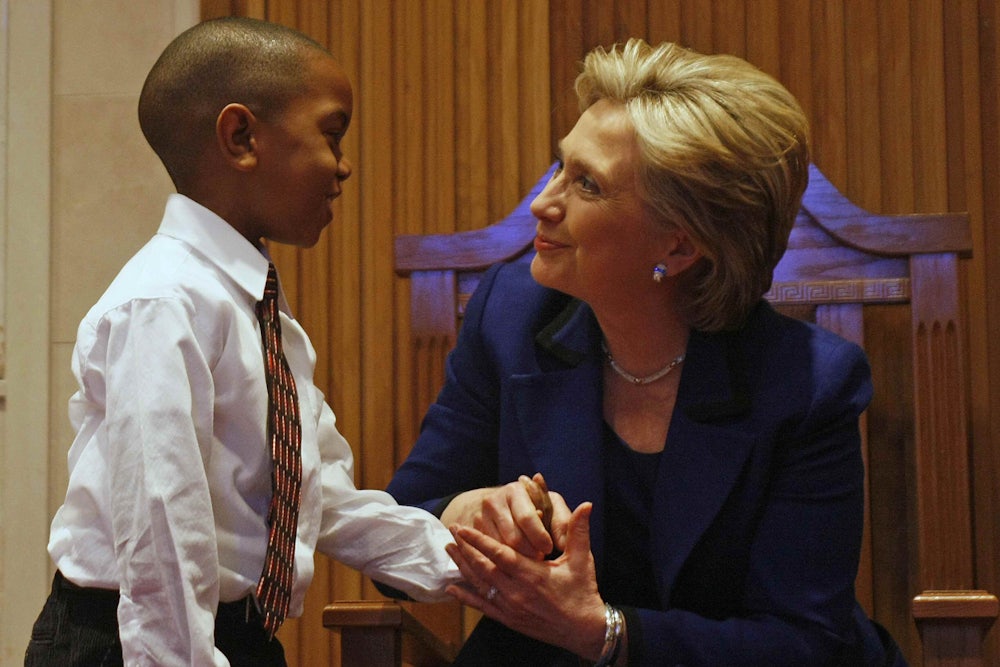During her historic run for the presidency, Hillary Clinton has made much of her record of fighting for women and children. As First Lady, she played a pivotal role in passing the Children’s Health Insurance Program, which provides medical care to eight million kids. And on the campaign trail, she’s fond of trumpeting her support for paid family leave and child care for working families. “I’ve spent my life fighting for children, families, and our country,” Clinton said at a rally in 2015. “I believe that success isn’t measured by how much the wealthiest Americans have, but by how many children climb out of poverty.”
But over the course of her career, Clinton may have thrown more children into poverty than she’s rescued from its clutches. During her husband’s time in the White House, she supported the mass incarceration of African American men, which left millions of black women raising families on their own. And she played a crucial role in the passage of welfare reform, which gutted cash benefits to poor women and children based on the false claim that lazy and sexually promiscuous “welfare queens” were somehow bilking the system. Thanks in part to the policies she backed, one in five children in the United States—some 16 million kids—now live in poverty. That’s a higher rate than in every industrialized nation except Greece, Spain, Latvia, Israel, and Mexico.
If Clinton is genuine about wanting to help America’s neediest kids, there’s a commonsense solution she can champion that would instantly reverse much of the damage she’s done over the years: providing every American family with a child allowance, regardless of their income level. According to a recent report by the Century Foundation, a nonpartisan think tank, offering families an annual benefit of $4,000 for every kid would reduce child poverty in the United States by more than half.
A universal child allowance would fix what’s broken in our current system. Right now, families qualify for a federal child tax credit only if they make more than $3,000 per year. That leaves out the poorest of the poor—disproportionately hurting black kids and the children of single mothers. (The number of children who live on $2 a day or less has more than doubled, to three million, since Bill Clinton signed welfare reform into law.) What’s more, the child tax credit arrives just once a year, at tax time. A universal child allowance, by contrast, would provide cash on a regular basis—allowing parents to use it for daily expenditures such as groceries and child care.
Most industrialized nations, including the United Kingdom, Australia, Canada, and much of the European Union, already provide a child allowance to support families. “Every other developed nation makes a social statement that, universally, we’re going to ensure that there is money there on a monthly or weekly basis for families with kids,” says Rachel West, associate director of the poverty research program at the Center for American Progress.
So far, Clinton has resisted the idea of a universal child allowance. “I’m not ready to adopt a plan that comes from some other country,” she told Vox in June. But the proposal is gaining ground: A bill co-sponsored by House Minority Leader Nancy Pelosi would create a tax credit that would pay parents $125 each month for every child under the age of three. While the legislation wouldn’t go as far as a universal child allowance, its focus on younger children would help kids who require additional child care, and whose parents are more likely to be younger and poorer. “As parents, it’s very clear that the needs of a two-year-old are different from those of a teenager,” says Greg Duncan, a professor at the University of California in Irvine who studies child poverty.
The young-child tax credit would cost an estimated $15 billion per year and help lift one in seven poor children under the age of three out of poverty. A universal child allowance of $4,000 would cost much more—around $200 billion per year—but it would do far more to help poor kids of all ages. It would also be a smart investment: Child poverty costs the U.S. economy an estimated $672 billion a year in lost wages, higher crime, and sicker kids.
For Clinton, backing a big idea like a universal child allowance would be a way to create a new legacy for herself. She was no bystander when it came to welfare reform—as late as 2002, she was still calling mothers on welfare “deadbeats.” But she has proven that she can change with the political times. “Poverty is not inevitable,” West says. “We can solve it with policy. Here’s a chance for Clinton to keep what was good during the last Clinton administration and mitigate what was not. It’s a huge opportunity, and one she should take.”
